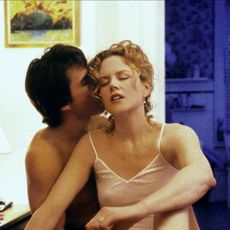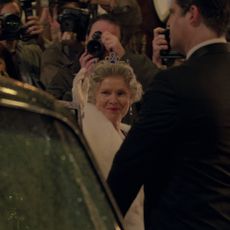Women, Sex and Politics in the Middle East, or maybe everywhere.
The butterfly effect is a metaphor for the concept that small, seemingly insignificant events—like the fluttering of a butterfly's wings—can produce tremendous and unanticipated consequences. In this blog, Zainab Salbi, the founder of the humanitarian group Women for Women International, explores the often untapped and under-appreciated capacity of women around the world to cause major and lasting change for good.
Read Zainab's previous blog post here.
In my recent trip to Iraq and Gaza, I met two women who both were faced with paying personal price for their political reality. One had the personal support of her father, so she survived, and one was faced by a blind look by her brothers and she didn't.
Jameela, a Palestinian woman from Gaza, was the lucky one, and Muna, an Iraqi woman from Basra, was the unlucky one. But both, at the end of the day, were left in a shattered place. The first went to an Israeli prison for 2 years when she was 18 years old. The stories of who gets into Israeli prisons and who doesn't are long and will be left for another time and day in the future. The summary of which, from my point of view, is that Palestinians are often swapped off to the prisons—some of them are in for serious reasons, and many are teenagers like Jameela who may have broken a besiege by walking in it, or carried a letter, or such things that, in my opinion, do not justify long prison sentances for teenagers or torture, which his what Jameela faced.
Jameela was smuggling letters for PLO members when she was captured at the age of 18. The day of her capture, her eyes met another man's, another young Palestinian, who was about 20, also being processed to go to prison. That look led to their love and years later, their eventual marriage. Little did she know that Mahmoud would be the only man with her father when she was released from prison two years later.
Jameela was tortured. She was hanged from her hands for long periods, she was put in solitary confinement for about 6 months, and had drops of water dripping on her forehead for hours at a time. She described her torture calmly. I didn't see anger in her at what happened as it was part of life. It was leaving the prison and seeing the response that her release generated in her community that upset her with a tone of cynicism. "Everyone asked my father to abandon me. I was damaged goods, they said". When I asked her why, she explained that when a woman goes to prison, people suspect that she was sexually molested and thus her honor taken away. This brought shame to the family and community. But when a man goes to prison he comes back honorable for his sacrifice and heroism. I guess no one talks about the possibility of sodomy in prison, I thought to myself without knowing much about Israeli prisons, but just prisons in general. "The only two men who stood by me", she explained, "Was my father and the man whose eyes met mine in prison".
Stay In The Know
Marie Claire email subscribers get intel on fashion and beauty trends, hot-off-the-press celebrity news, and more. Sign up here.
"My father shut off everyone in the community. He said my daughter is a heroine and I am welcoming her by sacrificing a sheep (part of a Muslim tradition to honor someone). "He had a feast for me. He stood by me and with me in front of the whole community, who urged him to abandon me less I was sexually damaged. My honor was not touched", she explained. "But my voice was irrelevant when it came to the community. Between my father and the young man who came to ask for my hand after waiting for me for two years (he was released after 6 months only), the community eventually accepted me". Jameela stopped her political activism when she became a mother, and so did her husband. Eventually, they focused on raising their 6 children, saving enough money to build their own dream home, and just live a basic life. But when I met her in December of 2009, it seemed like she lost it all.
Her house was more or less destroyed by the war in Gaza in December/January of 2008/9. She was living with her husband, children and even grandchildren in one room, the only room in the house that, except for a big hole in one wall, was not fully destroyed. "What can we do?" she asked, "We have no other place to go." As she talked to me, she showed me the room, the plastic sheet that covered the hole in the wall and the wet blankets and mattresses they slept on as it was raining the night before.
Unlike Mona, there was no politics left in Jameela. It felt like she had tried it, got punished by it, and now, as she lives in her destroyed house, she knows that the same reasons that got her engaged in politics 22 years ago still exist, but she has six kids to worry about and two grandchildren and a destroyed house. She needs to do what she can to hold on to what she has, but doesn't know if her children can do that as well, or her grandchildren for that matter.
It was different for Mona from Bazra, Iraq. Mona was 16 when Saddam invaded Kuwait in 1990 and the US launched the Gulf War in 1991. During the days and weeks that followed the war, many Iraqis who were opposed to Saddam's oppressive regime found the courage to rise against him. As a matter of fact, for 6 days, Saddam lost control over Iraq, until he was allowed to fly his planes into the no fly zone. He did, and he brought his army to crush the uprising (a historical moment that was confusing for many in the world as the US allowed him to fly into the no fly zone, knowing that the purpose of which is to crush the rebels against him).
Mona's 2 brothers were among those who rebelled against Saddam. They were eventually captured by Saddam's army and put in prison. Mona was sent by her elderly and worried mother to search for her brothers and check on their fate. When she finally met the army captain who was in charge of the section that held her brothers as prisoners, she begged him to release her brothers. The government was still in ruins with no courts or central orders to the military, so each section acted on its own, which meant that informal releases were possible.
The captain asked Mona into his office to hear her story. She pleaded and explained her concerns over the health of her elderly and sick mother. It was there that he told her he will release her brothers but that will come at a price. "Think of it and come tomorrow". "I didn't get it" she explained. "So I went to him the next day to follow up on his promise to release my brothers. He took me to his office again, this time with a red file in his hand. He put the file on the table and showed me how it has all the details of my brothers, myself, my sister and my mother with charges written on it under the title Treason. 'With this file,' he said, 'I can execute not only your brothers, but your entire family, including yourself.' I shivered. Pale and scared, I begged him to release them. That's when he explained to me that he will if I slept with him. How could I?", she explained. "I am a virgin—something that is most cherished in the Middle East and is the sole thing that determines a woman's honor. But he didn't care. I begged and cried yet he threatened me with the file and the possible execution.
Two hours later, he got tired of my pleading, so he took me by force, threw me on the desk, tore my shirt and raped me." The room was silent now as I listened to Mona and witnessed her tears and her shivers as she took me back to that moment. Mona then proceeded, without shedding a tear, to tell me how he ended up sleeping with her for months after that—how she ended up prostituted, then a madam, and thrown in prison. She talked about all of these things casually but when she described that moment of her rape, all the tears, pain and trauma came back to her.
Her brothers were released afterwards, just as he promised. The captain started a habit of visiting her daily at her family home. There, he would take her to a bedroom in her house, close the door behind him (her brothers, mother and sisters are still in the living room), and rape her. He would then leave her home. "Day after day, week after week, month after month he did that and not once did my brothers or mother said anything. As a matter of fact, when I would refuse to go with him, they would scold me and urge me to go to him so he wouldn't get upset. In the beginning, this whole ordeal was to save my brothers from prison. But eventually, I felt like my brothers were prostituting me so they didn't have to go back to prison. He showered us with gifts and food. He knew my family was very poor and helped us survive. No one mentioned the price I was paying. No one uttered a word even though he was raping me every day in my own family home".
"Eventually I got pregnant. When I told him, he rejected the child. Said it was not his. Said he would never marry a woman like me. When I persisted and told him of course it was his child, he said he will marry me but only after he comes back from home leave. But he never came back and he never sent a letter. He never told me where he was from. So when I finally told my family that I was pregnant, they rejected me and pretended they didn't know who impregnated me, pretended they never watched with closed eyes as I suffered. So I escaped".
It was a long journey that she took in a bus to Baghdad, a journey where she cried for hours. She met a woman who hosted her for a few days, where she ended up loosing the child. She was then sold by her hostess to another family, imprisoned by the woman who bought her, and was made a prostitute in the very room in which she was imprisoned. For a year she was kept in one room with one guard. There were 6 to 8 men a day until she pleaded to one of them to help her escape, which he did. But when she managed to escape, Mona found herself prostituted again, moving from managing a house for a madam to eventually becoming a madam herself, where she traded women with translators for the American army. She says the prostituted women she sent them were aged 12 to 20 years told. She ended up marrying and carrying a child with a client, who was a thief, and eventually went to prison as the police raided his house. It was in prison that she met a member of the Iraqi Women Freedom Organization who visited her regularly, who was able to locate her son for her and who was able to shelter her after her release.
When I met Mona, she was an activist dedicated to rescuing prostituted girls and women who, no different from her, ended up in a path not because of their desires but because they were saving loved ones as she saved her brothers. When she went back 15 years later to retrieve legal documents for her child, her tribe captured her, wanting to kill her for bringing shame upon their honor. Her brother's testimony that she was raped by the captain in exchange for her brothers' freedom led the tribe to release her from death, but they never wanted to see her again.
As one woman said, "Those who fight are doing well. Those who pay the price are the civilian population". According to the UN 90% of modern war casualties are civilians, 75% of which are women and children. That reality only addresses the death tolls created by war. Statistics are yet to capture the price women pay for wars often just for living in it and trying to survive it. On top of political and military pressure, women are often faced with another layer of community and traditional demands. Jameela and Mona's stories are just two among the many examples of the price women pay in war. When I ended my interview with Mona on my last day in Baghdad, she confessed saying, "My real name is Zainab too. Mona is just my disguise name." I left Baghdad trying to make sense of how two Zainabs can live in one country but face such different realities.
-
 Kourtney Kardashian Barker Loves Her Postpartum Body, Thank You Very Much
Kourtney Kardashian Barker Loves Her Postpartum Body, Thank You Very MuchAfter a body shaming troll tried to tear her down, she reminded them that her body “gave me my 3 big babies and my little baby boy.”
By Rachel Burchfield Published
-
 Clara Bow’s Great-Granddaughters React to Taylor Swift’s ’The Tortured Poets Department' Song Named After the Famous Actress
Clara Bow’s Great-Granddaughters React to Taylor Swift’s ’The Tortured Poets Department' Song Named After the Famous ActressThey “couldn’t believe” Swift named a song after the 1920s star.
By Danielle Campoamor Published
-
 Here’s How to Get Out of a Speeding Ticket, According to Zendaya and Tom Holland
Here’s How to Get Out of a Speeding Ticket, According to Zendaya and Tom HollandUnfortunately, the rest of us might not be able to use this tactic.
By Rachel Burchfield Published
-
 The Best Bollywood Movies of 2023 (So Far)
The Best Bollywood Movies of 2023 (So Far)Including one that just might fill the Riverdale-shaped hole in your heart.
By Andrea Park Published
-
 ‘Bachelor in Paradise’ 2023: Everything We Know
‘Bachelor in Paradise’ 2023: Everything We KnowCue up Mike Reno and Ann Wilson’s “Almost Paradise."
By Andrea Park Last updated
-
 Who Is Gerry Turner, the ‘Golden Bachelor’?
Who Is Gerry Turner, the ‘Golden Bachelor’?The Indiana native is the first senior citizen to join Bachelor Nation.
By Andrea Park Last updated
-
 ‘Virgin River’ Season 6: Everything We Know
‘Virgin River’ Season 6: Everything We KnowHere's everything we know on the upcoming episodes.
By Andrea Park Last updated
-
 The 60 Best Musical Movies of All Time
The 60 Best Musical Movies of All TimeAll the dance numbers! All the show tunes!
By Amanda Mitchell Last updated
-
 'Ginny & Georgia' Season 2: Everything We Know
'Ginny & Georgia' Season 2: Everything We KnowNetflix owes us answers after that ending.
By Zoe Guy Last updated
-
 35 Nude Movies With Porn-Level Nudity
35 Nude Movies With Porn-Level NudityLots of steamy nudity ahead.
By Kayleigh Roberts Last updated
-
 The Cast of 'The Crown' Season 5: Your Guide
The Cast of 'The Crown' Season 5: Your GuideThe Mountbatten-Windsors have been recast—again.
By Andrea Park Published